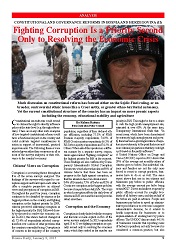
DPC BOSNIA DAILY: Constitutional And Governance Reforms In Bosnia and Herzegovina (II)
Bosnia Daily: January 9, 2015 – Constitutional And Governance Reforms In Bosnia and Herzegovina (II)
More...We kindly inform you that, as long as the subject affiliation of our 300.000+ articles is in progress, you might get unsufficient or no results on your third level or second level search. In this case, please broaden your search criteria.

Bosnia Daily: January 9, 2015 – Constitutional And Governance Reforms In Bosnia and Herzegovina (II)
More...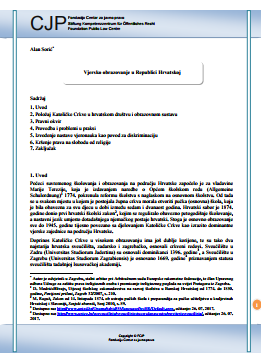
This paper investigates issues relating to religious education in public school system in the Republic of Croatia. It focuses mainly on Catholic Catechism in public school, due to the fact that population of Croatia is predominantly Catholic and the fact that Croatia has entered into international accords with Holy See. Paper particularly analyzes and describes instances of discrimination of nonreligious school children and criticizes the fact that no alternative education is provided to such children, at least in the first three grades of elementary schools. Finally, the paper offers certain recommendations to mitigate existing problems and to eliminate discrimination from public school system of the Republic of Croatia.
More...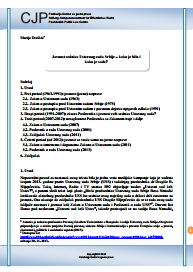
Pitanje javnosti rada Ustavnog suda, koje je izazvalo tako veliku polemiku kako među samim sudijama Ustavnog suda tako i u profesionalnim krugovima i medijskoj javnosti, verovatno da nije zasluživalo veliki prostor i vreme koje je potrošeno da bi se razjasnilo o čemu je zapravo reč. Ustavna garancija javnosti rasprave pred Ustavnim sudom, uz opšteprihvaćene standarde za isključenje javnosti (koji se odnose na zaštitu interesa nacionalne bezbednosti, javnog reda i morala u demokratskom društvu, kao i zaštitu interesa maloletnika ili privatnosti učesnika u postupku), odnosila se oduvek samo na javno raspravljanje učesnika u postupku pred Ustavnim sudom. Iznenada, neoprezno i bez dovoljne svesti o posledicama, Poslovnik o radu Ustavnog suda iz 1991. godine neočekivano je javnost uveo i na sve redovne sednice Ustavnog suda, na kojima se nije odvijala javna rasprava, već se na njima obavljalo većanje i glasanje sudija o predloženoj odluci. Moguće je pretpostaviti da se to dogodilo usled nedovoljnog razlikovanja faze većanja od ostalih faza u postupku odlučivanja Ustavnog suda u predmetima klasične ustavnosudske nadležnosti u normativnoj kontroli. Nažalost, iako je takva nezakonita praksa trajala godinama, neprirodnost slike „direktnog prenosa svega onog što se događalo na sednici Suda“ ili sudije koji učestvuje u većanju i glasanju, a svoja gledišta iznosi pred predstavnicima medija i svoja uverenja brani uz nadzor televizijskih kamera, nije time bila manje upečatljiva.
More...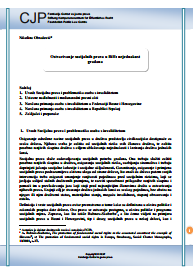
The article analyzes the issue of achieving social rights in Bosnia and Herzegovina through the amount of cash benefits for people with disabilities in accordance with Entity regulations on social security, veteran - disability protection, protection of civilian victims of war, and pension and disability insurance. In fact, despite the constitutional provisions on guaranteeing social rights and prohibition of discrimination, and international commitments of the state and all levels of governments, which have become valid upon entry into force of the UN Convention on the Rights of disabled persons, and other international legal documents pertaining to insure social rights in Bosnia and Herzegovina, the most vivid example of inequality is visible in the treatment of persons with disabilities by the government. This inequality is reflected in set conditions and the amount of cash benefits, as well as other rights guaranteed which is done in accordance with cause of disability, but should be done according to estimate of needs of persons with disabilities (regardless of the cause of the disability) for more effective inclusion in society.
More...
The author discusses the issue of equality and inequality in achieving rights from pension and disability insurance in Bosnia and Herzegovina through the analysis of the set conditions related to insurance and age limits regarding the rights to old-age pension in accordance with the general provisions on the pension and disability insurance, and special regulations on the retirement in both entities. A special problem of inequality occur due to differences in incomes of pensioners, beneficiaries of the entity’s pension found institutions and disability insurance, for the persons who were granted retirement before the war, with a single insurance found institution and the single economic space. This is an open problem that burdens the insurance institution in the entities. In the conclusions and recommendations, the author suggests modalities to resolve the issues of inequality by strengthening the role of state government levels.
More...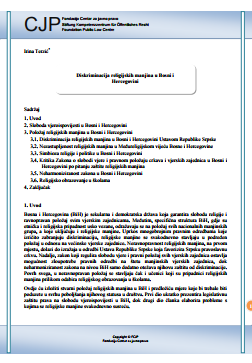
Isprepletenost etničke i religijske pripadnosti u BiH se direktno odražava na položaj religijskih manjina u BiH. Zbog takve karakteristične strukture, gdje se svi napori usmjeravaju ka pružanju jednakog tretmana trima većinskim religijama, prava religijskih manjina ostaju zapostavljena. Iako su na snazi mnogi pravni propisi koji garantiraju jednak položaj svih religijskih zajednica, religijske manjine se svakodnevno stavljaju u obespravljen položaj. Na primjer, to je vidljivo iz činjenica da Ustav Republike Srpske navodi Srpsku pravoslavnu crkvu kao crkvu srpskog naroda i drugih naroda pravoslavne vjere, te da religijske manjine nisu zastupljene u Međureligijskom vijeću BiH. Pored toga, obespravljenost religijskih manjina dolazi do izražaja prilikom religijskog obrazovanja u školama, gdje u većini slučajeva učenici nisu u mogućnosti da pohađaju religijsko obrazovanje po svom izboru, nego zbog okolnosti pristaju na vjersku pouku većinske religije. Problemi sa legislativom u BiH, kao što su neharmoniziranost, te siromašna zakonska zaštita od diskriminacije, samo dodatno doprinose marginalizaciji religijskih manjina u društvu. Zbog pojedinih ustavnih odredbi, gdje se povlašteni položaj daje određenoj religiji, te uske povezanosti religije i politike, BiH sve više daje utisak polusekularne države, u kojoj se za vođstvo takmiče tri većinske religije. Iz svega navedenog je očito da bi vlasti BiH trebale poduzeti različite mjere kako bi religijske manjine zaštitile od diskriminacije. Prvi korak ka tome je ukinuti odredbu Ustava Republike Srpske, kojom se daje povlašteni položaj Srpskoj pravoslavnoj crkvi. Dalje, religijske manjine treba da budu zastupljene u organima Međureligijskog vijeća u BiH. Aktivnim djelovanjem Međureligijskog vijeća mogao bi se znatno poboljšati položaj religijskih manjina u društvu. Pored toga, vlasti BiH bi trebale poduzeti korake kako bi harmonizirali i ojačali zakone vezane za zaštitu od krivičnog djela poticanja na mržnju. Iako krivična djela počinjena iz mržnje prema religijskim manjinama nisu česta pojava u BiH, ipak stručnjaci za ljudska prava su ukazali na njihovo postojanje. Stoga, harmonizacija zakonodavstva bi znatno olakšala sudijama i tužiocima sankcioniranje krivičnog djela poticanje na mržnju, što bi doprinijelo konzinstentnosti sudske prakse, a time i efektivnijoj zaštiti i prevenciji od sličnih zločina. Naposljetku, jedna od ključnih stvari za uklanjanje diskriminacije religijskih manjina u BiH jeste izmjena dosadašnjeg načina religijskog obrazovanja u školama. Umjesto vjerske pouke o samo jednoj vrsti religije, učenici treba da se educiraju o različitim kulturama i religijama. Kao što je prethodno navedeno, zbog okolnosti, škole su ograničene u pogledu pružanja vrste religijskog obrazovanja, tako da bi ovakva opcija bila prikladna za učenike svih vjeroispovijesti, kod kojih bi se ujedno i razvijala svijest o važnosti tolerancije i ravnopravnosti u društvu.
More...
- Povezivanje geografije i ekonomije, koje se postiže regionalnim integracijama, donosi brojne prednosti povećanjem međuzavisnosti između užih regiona i smanjivanjem njihovih tendencija ka autarihičnosti. - Teoretski model nodalno-funkcionalne regionalizacije je značajno poremećen u slučaju dezintegracije bivše Jugoslavije, kao dijela regiona Jugoistočne Evrope, a posebno unutar Bosne i Hercegovine kao subregiona. - Drastiščan pad GDP-a najbolji je dokaz za ovakav zaključak, pošto to nije uzrokovano samo ratom, nego i vještačkim podjelama nekada konzistentnih regiona. - Bazični ekonomski indikatori za Bosnu i Hercegovinu, kao što su GDP per capita, stopa nezaposlenosti, struktura privrede, odnos uvoza i izvoza i drugi, znatno su lošiji od većine zemalja u tranziciji, uprkos značajnoj pomoći međunarodne zajednice, što je direktna posljedica političke podjele na dva entiteta i dezintegrisane četiri bivše makroregije. - Procesi ekonomskih integracija na nivou Bosne i Hercegovine, bivše Jugoslavije i regiona Jugoistočne Evrope mogu se odvijati paralelno, mada su pomaci od užih ka širim regionima prirodni put. - Na nivou Bosne i Hercegovine najveća prepreka usklađivanju geografije i ekonomije je postojanje dva entiteta sa velikom samostalnošću i autarhičnim tendencijama, što dovodi do slabih centralnih institucija i nepostojanja jedinstvene strategije ekonomskog razvoja. - Brža ekonomska integracija regiona bivše Jugoslavije u interesu je svih novih samostalnih država koje su iza nje nastale, zbog komplementarnosti resursa, tradicije i nepostojanja jezičnih barijera.
More...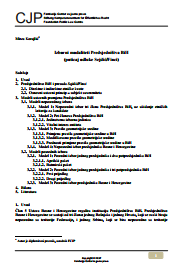
Član 5 Ustava Bosne i Hercegovine regulira instituciju Predsjedništva BiH. Predsjedništvo Bosne i Hercegovine se sastoji od tri člana: jednog Bošnjaka i jednog Hrvata, koji se svaki biraju neposredno sa teritorije Federacije, i jednog Srbina, koji se bira neposredno sa teritorije Republike Srpske. Članovi Predsjedništva biraju se neposredno u svakom entitetu, tako da svaki glasač glasa za popunjavanje jednog mjesta u Predsjedništvu Bosne i Hercegovine. Najupadljivija karakteristika Predsjedništva BiH je da je to institucija sastavljena od tri člana, a ne jedinstvena izvršna funkcija. Tročlano Predsjedništvo, kao i druge državne institucije u BiH, kreirane su tako da se dijeli moć između tri konstitutivna naroda, da ni u jednom državnom organu predstavnik bilo kojeg konstitutivnog naroda nema prevlast. Ovaj dio Ustava izražava etničku dimenziju unutrašnjeg uređenja države Bosne i Hercegovine i gotovo isključivo se bavi postojanjem i djelovanjem tri „konstitutivna naroda“, ili tri etničkovjerske skupine, Bošnjaka, Hrvata i Srba. U tom dijelu „Ostali“ narodi, kao i „građani“, mada se spominju u Preambuli Ustava BiH, praktično su ostali izvan domašaja ustavne regulacije. Dakle, dva su glavna problema današnjih izbora članova Predsjedništva BiH: 1. U Predsjedništvo mogu biti izabrani samo pripadnici konstitutivnih naroda i na taj način se isključuju (diskriminiraju) „Ostali“. Znači, „Ostali“ nemaju pasivno biračko pravo, kao jedno od osnovnih političkih prava građana u savremenim demokracijama. Dok je aktivno biračko pravo opšte, pasivno biračko pravo je ograničeno. 2. Kombinacija teritorijalnih i etničkih propisa isključuje (diskriminira) Bošnjake i Hrvate iz Republike Srpske i Srbe u Federaciji BiH da budu izabrani u Predsjedništvo BiH, ali i da glasaju za člana Predsjedništva svoje etničke grupe, tako da se aktivno i pasivno biračko pravo uskraćuje za oko 45% građana BiH. Takvim pravilom se samo pripadnici određene etničke grupe mogu smatrati potpuno lojalnim građanima entiteta, koji mogu braniti njegove interese. Prema tome, postoji diskriminacija u oba entiteta sva tri konstitutivna naroda: Bošnjaka, Srba i Hrvata, kao i nacionalnih manjina, a posebno se diskriminiraju građani Bosne i Hercegovine, jer nemaju ista politička prava u izbornom procesu na cijeloj teritoriji BiH. Slijedi da je ugrožen princip jednakosti građana u pogledu pristupa najvažnijim državnim funkcijama. Na osnovu toga se može zaključiti da izbori za Predsjedništvo BiH nisu u potpunosti slobodni izbori i da ograničavaju aktivno i pasivno biračko pravo, kao i neke od osnovnih principa demokratskih izbora, jednake mogućnosti i puno učešće građana u političkim procesima. Presudom Evropskog suda za ljudska prava u predmetu Sejdić i Finci protiv Bosne i Hercegovine, sistem izbora članova Predsjedništva BiH i Doma naroda Parlamentarne skupštine BiH proglašen je diskriminirajućim u odnosu na „Ostale“. Problem diskriminacije Srba u Federaciji i Bošnjaka i Hrvata u Republici Srpskoj nije odlučen u pomenutoj presudi. Iako u Katalogu ljudskih prava koja sadrži Ustav Bosne i Hercegovine nije izričito nominirana lista političkih prava, s obzirom na međunarodne standarde koji su sadržani u Ustavu, može se zaključiti da su garancijama političkih prava obuhvaćena prvenstveno: prava koja uključuju slobodu mišljenja, savjesti i vjere; slobodu izražavanja i štampe; aktivno i pasivno biračko pravo, kao i pravo na demokratske izbore; zabrana diskriminacije u skladu sa članom 2 (4) Ustava BiH. To znači da građani pod uvjetima opće jednakosti i bez diskriminacije po bilo kojem osnovu, imaju pravo da biraju i da budu birani, te da bez ikakve diskriminacije upravljaju javnim poslovima i da im bude, pod jednakim uslovima, dostupno vršenje javne službe. Iako bi se iz ovoga moglo zaključiti da izborno pravo, kao i druga politička prava, pripadaju građanima u Bosni i Hercegovini na cijelom njenom teritoriju i bez bilo kakve diskriminacije, ipak postoji nesklad i kolizija ovih ustavnih odredbi u odnosu na ustavne norme koje uređuju pitanja izbora, između ostalog, i Predsjedništva BiH.
More...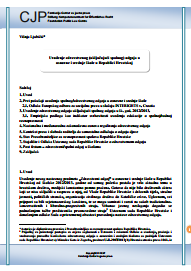
The author analyzes the introduction of health education, including sex education, into the system of compulsory primary and secondary education in the Republic of Croatia, from the first initiative of the late 90s to the present time. The author writes about public controversy between traditionally conservative and liberally progressive social forces regarding the right of parents, who hold certain world views to make independent decisions about the education of children, and, on the other hand, the constitutional obligation of the State to ensure children's right to a full and harmonious development of their personalities. The issue is addressed from the perspective of the case law of the European Court of Human Rights, which has already dealt with this issue, and the decision of the Constitutional Court of the Republic of Croatia, which emphasizes the importance of democratic, pluralistic approach in the creation of educational contents, especially when it comes to sexual education of children. How to put an end to the controversy, whose intent is to dispute the school's program of sex education on the basis of religious and/or political beliefs, still is an open question.
More...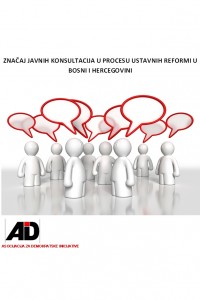
The process of constitutional reforms in Bosnia and Herzegovina has so far been driven without a serious participation and acceptance of the recommendations of civil society organizations in Bosnia and Herzegovina. Although the Council of Ministers of BiH has brought documents that regulate and facilitate the participation of citizens, civil society organizations and all other stakeholders in the process of drafting any legal act of public interest, the implementation of these documents has not been applied in practice. Over the past two years, a number of civil society organizations have been active in drafting possible constitutional solutions in accordance with the principles of the European Union and international standards in the field of constitutional law and human rights. Unfortunately, given the exclusion of civil society from the process of public consultation on constitutional reform and, ultimately, purely formal implementation, the prepared proposals were not taken into account by the competent institutions. Accordingly, the Delegation of the European Parliament for relations with Western Balkan countries has published a joint statement with the Joint Committee for European Integration of the Parliamentary Assembly of Bosnia and Herzegovina according to which constitutional reform, as a key reform in Bosnia and Herzegovina, must involve and engage civil society in this process in order to achieve the efficiency, fairness and functionality of the state.
More...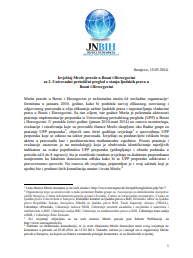
(B/H/S edition) The Justice Network in BiH is an informal network of 64 non-governmental organizations established in January 2010 to support development of efficient, independent, and accountable judiciary, in order to instigate more efficient protection of human rights and establishment the rule of law in Bosnia and Herzegovina (BiH). To this end, the Network launched monitoring of the implementation of UPR recommendations in BiH in the same year. During the last 4 years, i.e. in period from January 2010 to March 2014, based on the monitoring, evaluation and research activities conducted by the members of the Network gathered around the Working Group for monitoring the implementation of UPR recommendations, we have published 4 annual reports on implementation of UPR recommendations pertaining to the justice sector. The reports were submitted to an extensive number of the justice sector stakeholders and the international community. The process of monitoring and evaluation was based on the methodology which included the identification of measurable indicators for each UPR recommendation, data collection and processing in a period of 6 to 8 months, and drafting the report and additional recommendations for the local decision-makers to ensure that UPR recommendations are adequately and timely implemented. This summary, which was the subject of extensive consultations within and outside the Network, was prepared on the basis of the aforementioned reports.
More...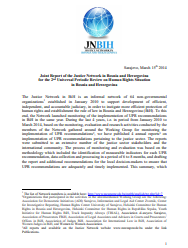
(English edition) The Justice Network in BiH is an informal network of 64 non-governmental organizations established in January 2010 to support development of efficient, independent, and accountable judiciary, in order to instigate more efficient protection of human rights and establishment the rule of law in Bosnia and Herzegovina (BiH). To this end, the Network launched monitoring of the implementation of UPR recommendations in BiH in the same year. During the last 4 years, i.e. in period from January 2010 to March 2014, based on the monitoring, evaluation and research activities conducted by the members of the Network gathered around the Working Group for monitoring the implementation of UPR recommendations, we have published 4 annual reports on implementation of UPR recommendations pertaining to the justice sector. The reports were submitted to an extensive number of the justice sector stakeholders and the international community. The process of monitoring and evaluation was based on the methodology which included the identification of measurable indicators for each UPR recommendation, data collection and processing in a period of 6 to 8 months, and drafting the report and additional recommendations for the local decision-makers to ensure that UPR recommendations are adequately and timely implemented. This summary, which was the subject of extensive consultations within and outside the Network, was prepared on the basis of the aforementioned reports.
More...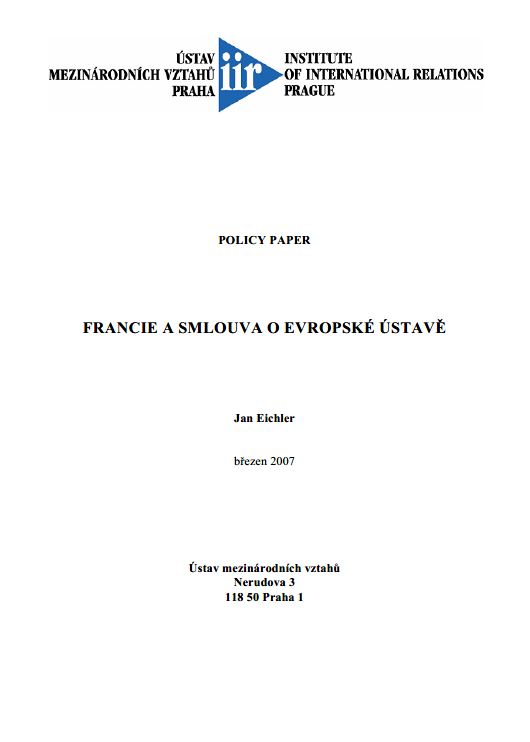
I po neúspěchu referenda v roce 2005 je Francie nadále jednoznačným stoupencem a jednou z hlavních hnacích sil procesu evropské integrace. Zesílila důraz na sociální dimenzi evropského modelu a na naplňování cílů Lisabonské strategie. Všichni tři hlavní kandidáti prezidentských voleb se shodují, že je nutné napsat nový text ústavní smlouvy, který by měl zdůraznit význam sociální politiky, energetické bezpečnosti, ochrany životního prostředí a společného přístupu k přistěhovalectví. Podporují další rozvoj zesílené a strukturované spolupráce a vytvoření funkcí prezidenta EU a ministra zahraničních věcí EU. Dva uchazeči se vyjadřují ve prospěch nového referenda, třetí (a doposud nejlépe připravený z nich) to odmítá a navrhuje „zjednodušenou smlouvu“, ke které by se nejprve vyjádřila mezivládní konference a potom francouzský parlament. A právě ten se z pohledu dalšího pokroku evropské integrace jeví jako nejlépe připravený a nejméně problémový. Ať vyhraje kdokoli, k textu z roku 2005 se vracet nebude. V určité parafrázi se znovu uplatní stará francouzská zásada: text smlouvy je mrtev, ať žije nový text.
More...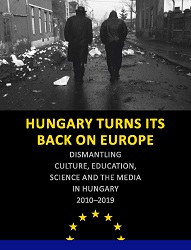
This report has been prepared by independent Hungarian intellectuals who wish to inform the Hungarian and international public as well as European institutions about the severe harm that the Orbán regime governing Hungary since 2010 has caused in the fields of education, science, culture, and the media. The reason for preparing the present report is that the acts of the successive Orbán governments consistently run counter to and consciously violate the fundamental principles, values, and norms of the European Union, not only as regards the rule of law and political and social rights, but also in the case of the cultural areas discussed here. In Hungary, important European values are being jeopardised, including cultural diversity, scientific and artistic autonomy, the respect for human dignity, access to education and culture, conditions for social mobility, the integration of disadvantaged social groups, the protection of cultural heritage, and the right to balanced information, as well as democratic norms like ensuring social dialogue, transparency and subsidiarity. By presenting the activities of the Orbán regime in the fields of culture, education, research, and the media, we provide information about areas little known to the international public. With our report, we wish to draw attention to the fact that an autocratic system has been constructed and consolidated in Hungary with the money of EU taxpayers and with the financial and political support of EU institutions. This system creates a worrying democratic deficit and severe social problems, while it also causes irreparable harm in the fields of education, science, and culture. The authors of the report are leading researchers, lecturers, and acknowledged experts, including several academicians, professors, heads of departments, and a former Minister of Culture. The undertaking was initiated and coordinated by the Hungarian Network of Academics
More...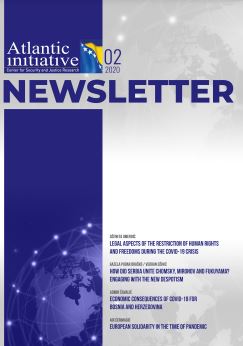
1. Legal Aspects of the Restriction of Human Rights and Freedoms During the COVID-19 Crisis. 2. How did Serbia Unite Chomsky, Mironov and Fukuyama? Engaging with the New Despotism. 3. Economic Consequences of Covid-19 for Bosnia and Herzegovina. 4. European Solidarity in the Time of Pandemic.
More...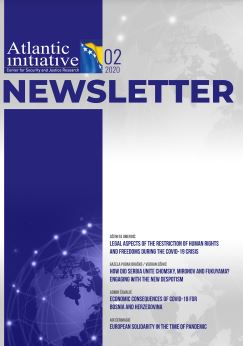
1. Pravni aspekti ograničenja prava i sloboda stanovništva u vrijeme krize izazvane pandemijom COVID-19. 2. Kako je Srbija ujedinila Chomskog, Mironova i Fukuyamu? Razmatranje novog despotizma. 3. Ekonomske posljedice pandemije COVID-19 po Bosnu i Hercegovinu. 4. Europska solidarnost u vrijeme pandemije.
More...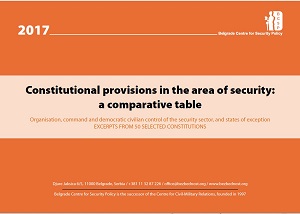
Belgrade Centre for Security Policy (BCSP) presents an overview of comparative constitutional norms on security with a view to promote debate on constitutional reforms in Serbia in this area. The overview has taken a form of comparative table consisting of selected constitutional provisions of 50 states and entities altogether, divided by regions. The first chapter is dedicated to Western Balkans states and entities which, due to shared recent historical and political experience, represent a first point of reference for comparison with Serbia (excerpts of Serbian constitution are also provided in the table). The second chapter covers most of the Eastern and Central European states, that underwent similar political transitions since the 1990s and are now members of the European Union. The third chapter covers 15 other EU member states and Switzerland, usually referred to as the Western Europe. Selected constitutional provisions of several, also transitioned, former Soviet Union states are offered in the fourth chapter. Finally, aiming at a broader perspective, a random selection of other countries all over the globe is presented in the fifth chapter.
More...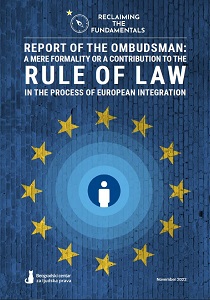
In this document, the position of the Ombudsman (Protector of Citizens) will be discussed from the point of view of the attitude of the National Assembly and the Government of the Republic of Serbia toward the Ombudsman’s regular annual reports. In the past ten years, Serbia has largely regressed in terms of democracy and the rule of law. Data from international and domestic organisations point to a state that has been captured by one party, the collapse of the separation of powers, and the absence of political dialogue. On the other hand, the Government of Serbia keeps emphasising the rule of law as its main priority in the accession negotiations with the European Union (EU). For the EU, the development of democratic processes is the main aspect of Serbia’s approach. In such circumstances, the attitude of the legislative and executive powers towards the report of the Ombudsman shows whether the authorities are essentially or just formally committed to the rule of law and admission to the European Union. The Ombudsman is an independent state body that protects the rights of citizens and controls the legality of the work of the administration. Its role is protected by the Constitution of the Republic of Serbia. The Global Alliance for National Human Rights Institutions (GANHRI) gave it the highest status A, which shows that its work is in line with international standards. However, analyses reveal certain weaknesses of this independent institution. The reports on Serbia’s progress in the process of accession to the European Union for 2021 and 2022 highlighted the need to strengthen the Ombudsman by providing staffing and financial resources and ensuring systematic cooperation with the authorities. Although there are numerous challenges in the work of the Ombudsman, this document analyses only the practice of its reporting to the National Assembly, in the context of ongoing reforms implemented for the purpose of Serbia’s accession to the European Union. We particularly stress the importance of the Ombudsman in strengthening democratic institutions and fulfilling the criteria from the negotiation Chapters 23 (Judiciary and Fundamental Rights) and 24 (Justice, Freedom and Security), and propose solutions that contribute to political responsibility and the rule of law.
More...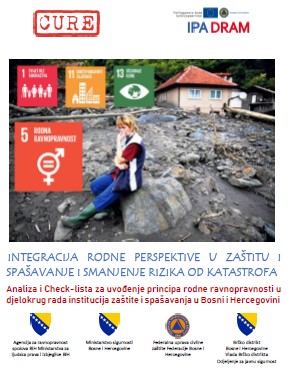
Analizu Integracija rodne perspektive u zaštiti i spašavanju i smanjenju rizika od katastrofa je provela Fondacije Cure u saradnji, upute i usmjeranja članova IPA DRAM BiH radne grupe i Agencije za ravnopravnost spolova BiH Ministrastva za ljudska prava i izbjeglice BiH, u okviru Regionalnog IPA DRAM programa pod nazivom “Procjenjivanje rizika i mapiranje u Zemljama Zapadnog Balkana i Turskoj“ [Instrument for Pre-Accession Assistance (IPA) Disaster Risk Assessment and Mapping in the Western Balkans and Turkey (DRAM)]. Zemlje korisnice ovog programa su Albanija, Bosna i Hercegovina, Sjeverna Makedonija, Crna Gora, Srbija, Kosovo i Turska.Svrha Regionalnog IPA DRAM programa, je unapređenje koherentnih nacionalnih sistema za prikupljanje podataka o štetama i gubicima u nesrećama i katastrofama, procjeni rizika i mapiranju, kao i usklađivanje i integracija u Mehanizam civilne zaštite Europske unije. Jedno od „cross-cutting“ pitanja IPA DRAM programa je integracija rodne perpesktive u zaštitu i spašavanje i smanjenje rizika od nesreća i katastrofa. S time u vezi je 5. i 6. marta 2019. godine u Švedskoj održana IPA DRAM regionalna radionica na ovu temu, a čija namjera je bila uspostaviti kontakt između institucija zaštite i spašavanja i institucija nadležnih za rodnu ravnopravnost u cilju utvrđivanja potrebe uvođenja principa rodne ravnopravnosti u djelokrug rada institucija zaštite i spašavanja. Tokom radionice došlo se do zaključka da je neophodno provesti edukacijske programe, izraditi vodiče i uputstva i osigurati bolju koordinaciju institucija nadležnih za zaštitu i spašavanje i rodnu ravnopravnost. Iz radionice je proizašao prijedlog da svaka od zemalja provede aktivnost kojom će inicirati ili unaprijediti integraciju rodne perspektive u zaštitu i spašavanje i smanjenje rizika od nesreća i katastrofa.
More...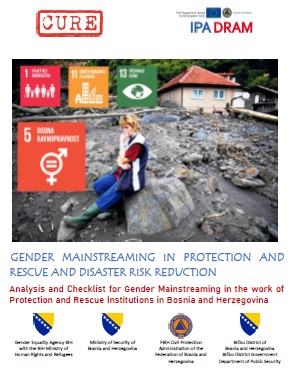
Analysis of Gender Mainstreaming in Protection and Rescue and Disaster Risk Reduction has been conducted by the Cure Foundation in cooperation, guidance and guidance of members of the IPA DRAM BiH Working Group and the BiH Gender Equality Agency of the BiH Ministry of Human Rights and Refugees, under the Instrument for Pre-Accession Assistance (IPA) Disaster Risk Assessment and Mapping in the Western Balkans and Turkey (DRAM) Regional Programme (IPA DRAM). Beneficiary countries of this programme are Albania, Bosnia and Herzegovina, Northern Macedonia, Montenegro, Serbia, Kosovo and Turkey. The purpose of the Regional IPA DRAM Programme is to improve coherent national systems for data collection on disaster-related damages and loses, risk assessment and mapping, as well as compliance and integration into the EU Civil Protection Mechanism. One of the cross-cutting issues of the IPA DRAM Programme is gender mainstreaming in protection and rescue and reducing the risk of accidents and disasters. In this regard, an IPA DRAM regional workshop on this very topic was held in Sweden on 5 and 6 March 2019. Its aim was to build contact between protection and rescue institutions and institutions responsible for gender equality in order to identify the need to have gender mainstreaming introduced in the work of the protection and rescue institutions. One of the conclusions from the workshop is the need to carry out educational programmes, develop guides and instructions and ensure better coordination of institutions responsible for protection and rescue and gender equality. The workshop resulted in a proposal for each country to undertake an activity to launch or advance gender mainstreaming in protection and rescue and reducing the risk of accidents and disasters.
More...